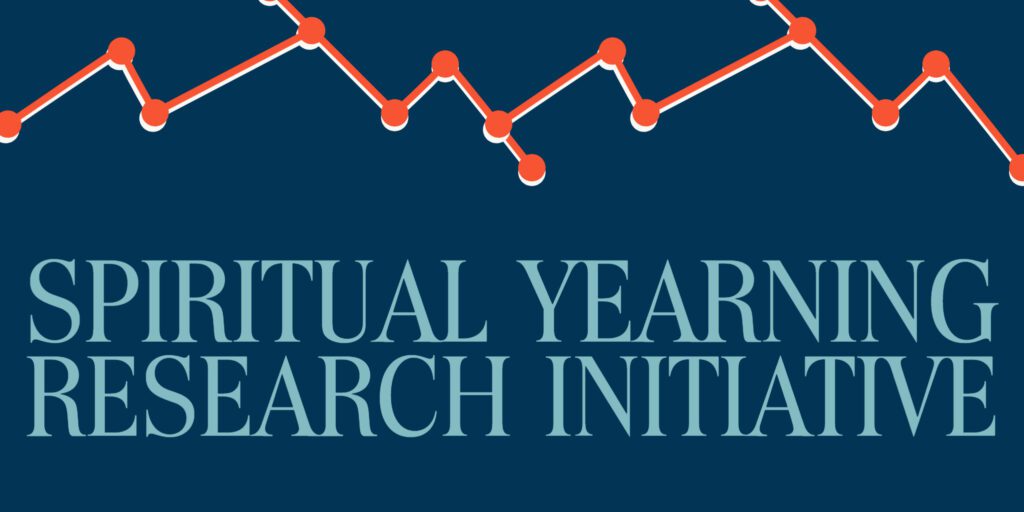Spiritual Yearning Research Initiative: The Search for Meaning Among the Nonreligious

The Spiritual Yearning Research Initiative (SYRI) is aimed at addressing the spiritual yearnings, existential concerns, and search for meaning of spiritually curious but nonreligious individuals and communities. SYRI’s overarching big question is: How can those who experience a deep yearning for a meaningful spiritual life, but find traditional religion unsatisfying, fulfill that yearning? This question involves empirical, conceptual, and normative dimensions, calling for an approach that is cross-disciplinary in nature. The Foundation’s aim in this initiative is to arrive at a better understanding of spiritual yearning and flourishing among the spiritually curious but nonreligious, by supporting research by scholars within philosophy, theology, religious studies, and the psychological sciences.
Background
The Foundation has long been committed to supporting projects that bring philosophical and theological scholarship into conversation with the sciences. The Religion, Science, and Society funding area is particularly interested in supporting research that advances our understanding of the ways in which religious and spiritual beliefs and practices affect human flourishing, both within and outside of religious traditions. This funding area seeks to address questions of meaning, spirituality, and purpose by encouraging research that engages substantively and critically with the sciences.
SYRI’s purpose is to support scholarship of this kind on the experiences, yearnings, and possibilities for spiritual flourishing of those who either do not find themselves at home within traditional religious communities or do not find the belief systems of traditional religions compelling. Such people may describe themselves as “religious Nones,” “spiritual but not religious,” agnostic, or something else altogether. Regardless of the particular label such individuals might use to describe their spiritual orientations, the Foundation is here primarily interested in spiritual yearning and meaning-making among the nonreligious, as opposed to those who are either uninterested in questions of existential or ultimate concern, or are otherwise unbothered by spiritual matters. Additionally, the initiative seeks to explore the ways in which the experiences and practices of the “spiritual but not religious” might constructively engage with and benefit individuals and communities within religious traditions.
Thematic Scope
This initiative focuses on the two broad themes of spiritual yearning and meaning-making for the nonreligious, with each of these themes covering a number of possible empirical and conceptual research questions. We invite proposals that make use of a variety of research methods, including but not limited to qualitative research, theory-construction, conceptual clarification, surveys, experimental research, and normative argument. We particularly encourage the development of projects that are cross-disciplinary or inter-disciplinary in nature, and that bring philosophical, theological, and religious studies scholarship into substantive engagement with the human and social sciences.
The following questions illustrate (but do not exhaust) the thematic scope of this initiative:
- The Nature of Spiritual Yearning: What kind of phenomenon is spiritual yearning? How can it be operationalized and measured? What do the spiritually yearning nonreligious describe as the object of their yearning? What are the differences between spiritual longing, spiritual questing, and spiritual curiosity? Is spiritual yearning a persisting phenomenon, or does it tend towards resolution or dissolution? How should we understand the role of spiritual struggles in meaning-making and spirituality among the nonreligious? To the degree that nonreligious individuals experience or report a lack of spiritual meaning, what is it they report lacking (e.g., community, ritual, grounds for morality, sacred spaces)?
- The Value of Spiritual Yearning: Is it good or bad to experience spiritual yearning? How should such experiences be assessed? Does spiritual yearning present a problem to be solved, or rather an experience that is in some way important for human flourishing? What are good and bad ways to address one’s spiritual yearning?
- The Potential Causes and Effects of Spiritual Yearning: Are there differences between people for whom spiritual yearning contributes to flourishing and those for whom it contributes to comparatively poorer outcomes? What are the differences between nonreligious individuals who experience spiritual longings and those who do not? Is there a difference between nonreligious people who approach existential or spiritual concerns with a growth mindset, and those who are more inclined toward a security-focused mindset? How might specific values or virtues such as hope mediate assessments of—or actions in relationship to—spiritual yearning? How does spiritual yearning relate to a person’s well-being, happiness, or flourishing? How does it relate to the way a person conceives of spiritual realities or their own life’s meaning?
- Addressing Spiritual Yearning: How might various theological or philosophical resources be made useful to spiritually yearning nonreligious people? How is spiritual yearning shaped by one’s past religious identity, practice, beliefs, and commitments? For example, how are ex-Christians, ex-Muslims, ex-Jews, ex-Buddhists, and ex-Hindus similar to and different from one another? How and to what extent can people experience the benefits of traditional religion without holding traditional religious beliefs?
- Spiritual Yearning in Practice: Which practices, experiences, and settings are most effective at facilitating meaningful spirituality among the nonreligious? Can ethical or moral commitments create or enhance spiritual meaning for the nonreligious? What is the role of community in meaning-making and spirituality among the nonreligious? What contributes to meaningful spiritual communities among the nonreligious, and what challenges do such communities face? What role might various spiritual technologies (e.g., social media, intentional experiences of nature, psychedelics) play in the formation of meaningful spirituality among the nonreligious?
Specific Questions?
If you have additional questions, please contact syri@templeton.org